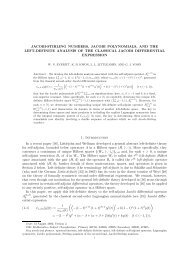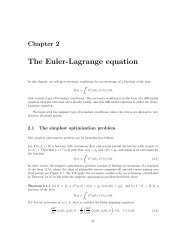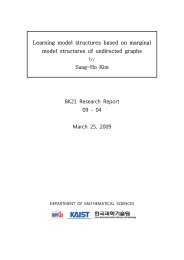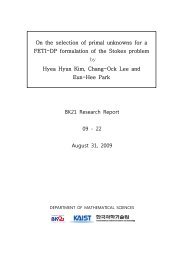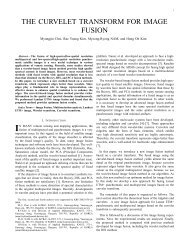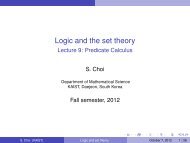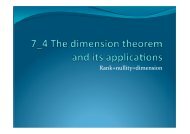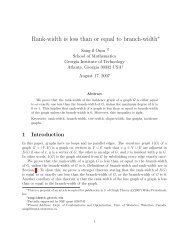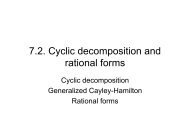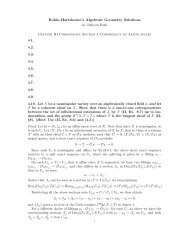On Random Discretization for Ito Diffusion Processes
On Random Discretization for Ito Diffusion Processes
On Random Discretization for Ito Diffusion Processes
You also want an ePaper? Increase the reach of your titles
YUMPU automatically turns print PDFs into web optimized ePapers that Google loves.
We tested the newly generated random numbers <strong>for</strong> some moments of τ whichis obtained from the exponential martingale exp (λW t − λ 2 t/2), λ ∈ R and relatedpolynomial type martingales - see [1] <strong>for</strong> the first and second moment andthe third moment is also obtained similarly using the polynomial martingalewhich are <strong>for</strong> h = 1,W 6t − 15tW 4t + 45t 2 W 2t − 15t 3 , t ≥ 0,Eτ = 1, Eτ 2 = 5/3, and Eτ 3 = 61/15.We included ±30 terms from the infinite series (7). We took n = 1000 andM = 5000 and 7000. See Table 1 <strong>for</strong> the test results.5 A Comparison <strong>for</strong> ErrorsFor fixed equidistant discretization, usually, the uni<strong>for</strong>m error <strong>for</strong> Brownianmotion W t is[]E max |W t − Y t |0≤t≤1<strong>for</strong> the approximate process Y t i.e., the average of the maximum error. But <strong>for</strong>our adaptive random discretization (4), the uni<strong>for</strong>m error has the deterministicupper bound and not uni<strong>for</strong>m just in the average sense. In this section, wecompare the errors <strong>for</strong> these two discretizations i.e. the average sense uni<strong>for</strong>merror <strong>for</strong> the equidistant discretization (AE) and the deterministic uni<strong>for</strong>merror <strong>for</strong> the random discretization (4)(DR).Since Eτ h = h 2 , Eτ h · EN ≈ 1, and the deterministic error bound is 2h <strong>for</strong>standard Brownian motion, we have2h ≈ 2 √EN. (8)We let m = EN and compare the deterministic error 2h with the averageerror <strong>for</strong> m-equidistant discretization.Let Y (m) (t) be the linearly interpolated Brownian motion <strong>for</strong> the equidistantnodes {i/m} 1≤i≤m and B i , i = 1, 2, . . . be independent Brownian bridges on8



